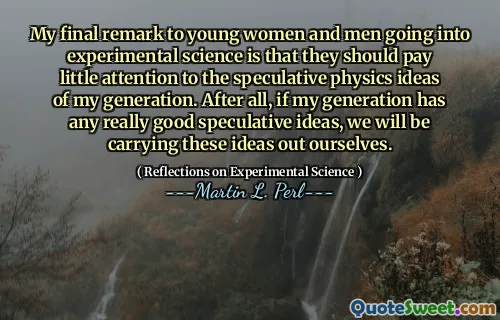Martin L. Perl was a distinguished physicist renowned for his pivotal contributions to particle physics. Born on June 24, 1927, he played a crucial role in the discovery of the tau lepton, a fundamental particle in the lepton family. This discovery took place while Perl was working at the Stanford Linear Accelerator Center in the late 1970s. His work not only enhanced our understanding of particle interactions but also opened new avenues for research in the field, contributing substantially to the Standard Model of particle physics. Perl's academic journey began at the City College of New York, where he developed a penchant for physics. He later earned his Ph.D. from Columbia University, embarking on a career that would see him collaborate with various institutions and researchers. His relentless pursuit of knowledge and innovation in the field of high-energy physics earned him respect and recognition among peers. Throughout his career, Perl was dedicated to both research and education, inspiring numerous young scientists. In addition to his scientific achievements, Perl was awarded the Nobel Prize in Physics in 1995, which solidified his legacy as a key figure in his field. Perl's work exemplified the intersection of theory and experimentation, showcasing the importance of both aspects in the advancement of science. His enduring influence on future generations of physicists and his contributions to the understanding of the universe make him an iconic figure in the realm of particle physics.
Born on June 24, 1927, Martin L. Perl was a significant figure in the field of physics, particularly known for discovering the tau lepton while at the Stanford Linear Accelerator Center. This discovery added depth to the Standard Model of particle physics and influenced further research in the domain.
Perl pursued his education at the City College of New York and obtained his Ph.D. from Columbia University. His career was marked by significant collaborations and a commitment to both research and educating future scientists, which earned him recognition among his peers and students.
Acknowledged with the Nobel Prize in Physics in 1995, Perl's legacy continues through his impactful work that merged theoretical and experimental physics. His contributions have left an enduring mark on the scientific community and inspire future generations in the pursuit of understanding the universe.
More »
Today Birthdays
1729 -
Edmund Burke
1949 -
Haruki Murakami
1954 -
Howard Stern
1876 -
Jack London
1993 -
Zayn Malik
1951 -
Kirstie Alley
1863 -
Swami Vivekananda
1923 -
Alice Miller
1987 -
Naya Rivera
1825 -
Brooke Foss Westcott
1944 -
Joe Frazier
1951 -
Rush Limbaugh
1964 -
Jeff Bezos
1978 -
Jeremy Camp
1628 -
Charles Perrault
1856 -
John Singer Sargent
1970 -
Kaja Foglio
1953 -
Rick Santelli
1986 -
Gemma Arterton
1968 -
Raf Simons
1958 -
Christiane Amanpour
1966 -
Olivier Martinez
1996 -
Ella Henderson
1917 -
Maharishi Mahesh Yogi
1949 -
Ottmar Hitzfeld
1928 -
Ruth Brown
1968 -
Heather Mills
1946 -
George Duke
1968 -
Rachael Harris
1923 -
Ira Hayes
